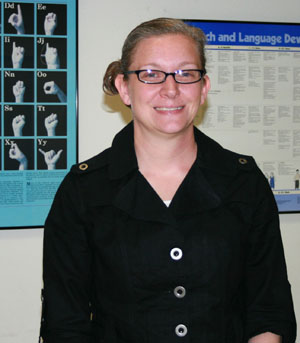Student Profile - Heather Moore
Connecting lives: Heather Moore pursues ASL degree at LU
Heather Moore traveled to and from her California high school by city bus. One day, a deaf man boarded the bus and, after a few minutes, became agitated and indicated to the driver that he needed help.
“I didn’t know how to sign yet, but I could finger spell because my great aunt was deaf. I went up to him and asked if he needed assistance. His face lit up and he got very excited. I helped him communicate to the driver that he had gotten on the wrong bus, and it was this epiphany for me that I could do something to help people and make a difference in their lives,” Moore said.
Now a major in the Department of Deaf Studies and Deaf Education at Lamar University, Moore is pursuing her lifelong goal of obtaining a Bachelor of Arts degree in American Sign Language.
She entered an associate-degree program in interpreter training after high school and achieved her certification. Her work as a substitute teacher at Mississippi’s School for the Deaf started her on her 14-year career as an educational interpreter.
Educational interpreters work as liaisons between deaf or hard-of-hearing students and their teachers by interpreting what their teachers are saying. “It seemed like a perfect fit me for because I always loved kids, but I didn’t want to be a teacher in the classical sense,” Moore said.
When she earned her associate degree in 1997, she very much wanted to complete her four-year degree, but only a handful of universities in the nation offered bachelor’s degrees in ASL at that time. After relocating to Beaumont with her minister husband and two children, she was elated to learn Lamar had the degree she sought, but financial concerns and family obligations weighed heavily on her decision to return to school.
“My 5-year-old son has Asperger’s Syndrome, and we were already trying to figure out his schooling. In addition, my husband left his position with the church to travel full time with his own ministry, and I work 40 hours a week or more as an educational interpreter. I started investigating the ASL degree and found I could make my school and work schedule complement one another nicely. I take 12 hours each semester and take my core classes online,” Moore said.
Moore is the recipient of a Project Train grant that pays for tuition, room and board and books for students getting their ASL degree in return for two years of service as an educational interpreter after graduation. Moore applied too late for her first semester to be funded through Project Train, so she used federal financial aid and sought out the scholarship office on campus to see if funds were available to make up the gap.
“There’s so much money out there for the taking, and some of it goes unused. I completed the scholarship application and told them everything about me so they could match me with a scholarship,” Moore said.
She received the Jack Baxter Tire Company Endowed Scholarship and the Frances Jane Carr Homer memorial Scholarship for the Visually Impaired.
Moore plans to graduate in May 2013, “if I play my cards right.” She is taking summer classes and mini-sessions in addition to her 12 semester hours.
“I love that all the professors in the department have been so supportive,” she said. “They’re all very encouraging because they know what a vital program this is and try to encourage you by every means possible.”
That support from the department is even more crucial now that Moore’s lifelong dedication to working with the deaf community has taken on a new meaning: her 3-year-old daughter has been diagnosed with hearing loss and is being fitted for hearing aids.
“It is always a challenge, fitting your life around your schoolwork, and I wouldn’t be able to do with without the convenience of Lamar University,” Moore said. “I can take online classes, and the campus is close to where I live. I don’t have to uproot my family to pursue my college dreams.”


